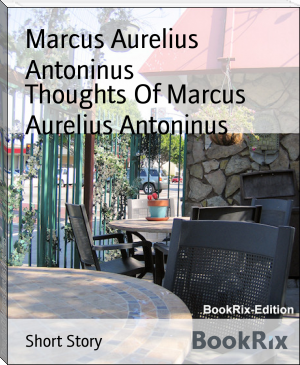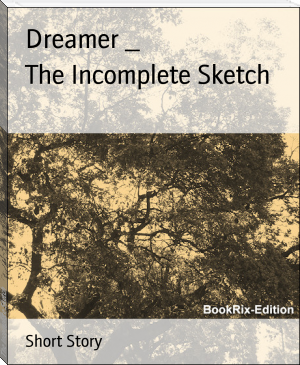Thoughts Of Marcus Aurelius Antoninus - Marcus Aurelius Antoninus (novels to read for beginners .TXT) 📗

- Author: Marcus Aurelius Antoninus
Book online «Thoughts Of Marcus Aurelius Antoninus - Marcus Aurelius Antoninus (novels to read for beginners .TXT) 📗». Author Marcus Aurelius Antoninus
Religion, No Ethical Philosophy Is Worth Anything, If The Teacher Has
Not Lived The "Life Of An Apostle," And Been Ready To Die "The Death Of
A Martyr." "Not In Passivity (The Passive Effects) But In Activity Lie
The Evil And The Good Of The Rational Social Animal, Just As His Virtue
And His Vice Lie Not In Passivity, But In Activity" (Ix. 16). The
Emperor Antoninus Was A Practical Moralist. From His Youth He Followed A
Laborious Discipline, And Though His High Station Placed Him Above All
Want Or The Fear Of It, He Lived As Frugally And Temperately As The
Poorest Philospher. Epictetus Wanted Little, And It Seems That He Always
Had The Little That He Wanted And He Was Content With It, As He Had Been
With His Servile Station! But Antoninus After His Accession To The
Empire Sat On An Uneasy Seat. He Had The Administration Of An Empire
Which Extended From The Euphrates To The Atlantic, From The Cold
Mountains Of Scotland To The Hot Sands Of Africa; And We May Imagine,
Though We Cannot Know It By Experience, What Must Be The Trials, The
Troubles, The Anxiety, And The Sorrows Of Him Who Has The World's
Business On His Hands, With The Wish To Do The Best That He Can, And The
Certain Knowledge That He Can Do Very Little Of The Good Which He
Wishes.
[A] De Marco Aurelio Antonino ... Ex Ipsius Commentariis.
Scriptio Philologica. Instituit Nicolaus Bachius, Lipsiae,
1826.
In The Midst Of War, Pestilence, Conspiracy, General Corruption, And
With The Weight Of So Unwieldy An Empire Upon Him, We May Easily
Comprehend That Antoninus Often Had Need Of All His Fortitude To Support
Him. The Best And The Bravest Men Have Moments Of Doubt And Of Weakness;
But If They Are The Best And The Bravest, They Rise Again From Their
Depression By Recurring To First Principles, As Antoninus Does. The
Emperor Says That Life Is Smoke, A Vapor, And St. James In His Epistle
Is Of The Same Mind; That The World Is Full Of Envious, Jealous,
Malignant People, And A Man Might Be Well Content To Get Out Of It. He
Has Doubts Perhaps Sometimes Even About That To Which He Holds Most
Firmly. There Are Only A Few Passages Of This Kind, But They Are
Evidence Of The Struggles Which Even The Noblest Of The Sons Of Men Had
To Maintain Against The Hard Realities Of His Daily Life. A Poor Remark
It Is Which I Have Seen Somewhere, And Made In A Disparaging Way, That
The Emperor's Reflections Show That He Had Need Of Consolation And
Comfort In Life, And Even To Prepare Him To Meet His Death. True That He
Did Need Comfort And Support, And We See How He Found It. He Constantly
Recurs To His Fundamental Principle That The Universe Is Wisely Ordered,
That Every Man Is A Part Of It And Must Conform To That Order Which He
Cannot Change, That Whatever The Deity Has Done Is Good, That All
Mankind Are A Man's Brethren, That He Must Love And Cherish Them And Try
Story 2 (The Philosophy Of Marcus Aurelius Antonius) Pg 18To Make Them Better, Even Those Who Would Do Him Harm. This Is His
Conclusion (Ii. 17): "What Then Is That Which Is Able To Conduct A Man?
One Thing And Only One, Philosophy. But This Consists In Keeping The
Divinity Within A Man Free From Violence And Unharmed, Superior To Pains
And Pleasures, Doing Nothing Without A Purpose Nor Yet Falsely And With
Hypocrisy, Not Feeling The Need Of Another Man's Doing Or Not Doing
Anything; And Besides, Accepting All That Happens And All That Is
Allotted, As Coming From Thence, Wherever It Is, From Whence He Himself
Came; And Finally Waiting For Death With A Cheerful Mind As Being
Nothing Else Than A Dissolution Of The Elements Of Which Every Living
Being Is Compounded. But If There Is No Harm, To The Elements Themselves
In Each Continually Changing Into Another, Why Should A Man Have Any
Apprehension About The Change And Dissolution Of All The Elements
[Himself]? For It Is According To Nature; And Nothing Is Evil That Is
According To Nature."
The Physic Of Antoninus Is The Knowledge Of The Nature Of The Universe,
Of Its Government, And Of The Relation Of Man's Nature To Both. He Names
The Universe ([Greek: Hê Tôn Hylôn Ousia], Vi. 1),[A] "The Universal
Substance," And He Adds That "Reason" ([Greek: Logos]) Governs The
Universe. He Also (Vi. 9) Uses The Terms "Universal Nature" Or "Nature
Of The Universe." He (Vi. 25) Calls The Universe "The One And All, Which
We Name Cosmos Or Order" ([Greek: Kosmos]). If He Ever Seems To Use
These General Terms As Significant Of The All, Of All That Man Can In
Any Way Conceive To Exist, He Still On Other Occasions Plainly
Distinguishes Between Matter, Material Things ([Greek: Hylê, Hylikon]),
And Cause, Origin, Reason ([Greek: Aitia, Aitiôdes, Logos]).[B] This Is
Conformable To Zeno's Doctrine That There Are Two Original Principles
([Greek: Archai]) Of All Things, That Which Acts ([Greek: To Poioun])
And That Which Is Acted Upon ([Greek: To Paschon]). That Which Is Acted
On Is The Formless Matter ([Greek: Hylê]): That Which Acts Is The Reason
([Greek: Logos]), God, Who Is Eternal And Operates Through All Matter,
And Produces All Things. So Antoninus (V. 32) Speaks Of The Reason
([Greek: Logos])Which Pervades All Substance ([Greek: Ousia]), And
Through All Time By Fixed Periods (Revolutions) Administers The Universe
([Greek: To Pan]). God Is Eternal, And Matter Is Eternal. It Is God Who
Gives Form To Matter, But He Is Not Said To Have Created Matter.
According To This View, Which Is As Old As Anaxagoras, God And Matter
Exist Independently, But God Governs Matter. This Doctrine Is Simply The
Expression Of The Fact Of The Existence Both Of Matter And Of God. The
Stoics Did Not Perplex Themselves With The In-Soluble Question Of The
Origin And Nature Of Matter.[C] Antoninus Also Assumes A Beginning Of
Things, As We Now Know Them; But His Language Is Sometimes Very Obscure.
I Have Endeavored To Explain The Meaning Of One Difficult Passage (Vii.
75, And The Note).
[A] As To The Word [Greek: Ousia], The Reader May See The
Index. I Add Here A Few Examples Of The Use Of The Word;
Antoninus Has (V. 24), [Greek: Hê Sumpasa Ousia], "The
Universal Substance." He Says (Xii. 30 And Iv. 40), "There Is
One Common Substance" ([Greek: Ousia]), Distributed Among
Countless Bodies. In Stobaeus (Tom. 1, Lib. 1, Tit. 14) There
Is This Definition, [Greek: Ousian De Phasin Tôn Ontôn Hapantôn
Tên Prôtên Hylên]. In Viii. Ii, Antoninus Speaks Of [Greek: To
Ousiôdes Kai Hyulikon], "The Substantial And The Material;" And
(Vii. 10) He Says That "Everything Material" ([Greek: Enulon])
Story 2 (The Philosophy Of Marcus Aurelius Antonius) Pg 19Disappears In The Substance Of The Whole ([Greek: Tê Tôn Holôn
Ousia]). The [Greek: Ousia] Is The Generic Name Of That Existence
Which We Assume As The Highest Or Ultimate, Because We Conceive
No Existence Which Can Be Coordinated With It And None Above
It. It Is The Philosopher's "Substance:" It Is The Ultimate
Expression For That Which We Conceive Or Suppose To Be The
Basis, The Being Of A Thing. "From The Divine, Which Is
Substance In Itself, Or The Only And Sole Substance, All And
Everything That Is Created Exists" (Swedenborg, Angelic Wisdom,
198).
[B] I Remark, In Order To Anticipate Any Misapprehension, That
All These General Terms Involve A Contradiction. The "One And
All," And The Like, And "The Whole," Imply Limitation. "One" Is
Limited; "All" Is Limited; The "Whole" Is Limited. We Cannot
Help It. We Cannot Find Words To Express That Which We Cannot
Fully Conceive. The Addition Of "Absolute" Or Any Other Such
Word Does Not Mend The Matter. Even The Word God Is Used By
Most People, Often Unconsciously, In Such A Way That Limitation
Is Implied, And Yet At The Same Time Words Are Added Which Are
Intended To Deny Limitation. A Christian Martyr, When He Was
Asked What God Was, Is Said To Have Answered That God Has No
Name Like A Man; And Justin Says The Same (Apol. Ii. 6), "The
Names Father, God, Creator, Lord, And Master Are Not Names, But
Appellations Derived From Benefactions And Acts." (Compare
Seneca, De Benef. Iv. 8.) We Can Conceive The Existence Of A
Thing, Or Rather We May Have The Idea Of An Existence, Without
An Adequate Notion Of It, "Adequate" Meaning Coextensive And
Coequal With The Thing. We Have A Notion Of Limited Space
Derived From The Dimensions Of What We Call A Material Thing,
Though Of Space Absolute, If I May Use The Term, We Have No
Notion At All; And Of Infinite Space The Notion Is The Same--No
Notion At All; And Yet We Conceive It In A Sense, Though I Know
Not How, And We Believe That Space Is Infinite, And We Cannot
Conceive It To Be Finite.
[C] The Notions Of Matter And Of Space Are Inseparable. We
Derive The Notion Of Space From Matter And Form. But We Have No
Adequate Conception Either Of Matter Or Space. Matter In Its
Ultimate Resolution Is As Unintelligible As What Men Call Mind,
Spirit, Or By Whatever Other Name They May Express The Power
Which Makes Itself Known By Acts. Anaxagoras Laid Down The
Distinction Between Intelligence [Greek: Nous] And Matter, And
He Said That Intelligence Impressed Motion On Matter, And So
Separated The Elements Of Matter And Gave Them Order; But He
Probably Only Assumed A Beginning, As Simplicius Says, As A
Foundation Of His Philosophical Teaching. Empedocles Said, "The
Universe Always Existed." He Had No Idea Of What Is Called
Creation. Ocellus Lucanus (I, § 2) Maintained That The Universe
([Greek: To Pan]) Was Imperishable And Uncreated. Consequently
It Is Eternal. He Admitted The Existence Of God; But His
Theology Would Require Some Discussion. On The Contrary, The
Brachmans, According To Strabo (P. 713, Ed. Cas.), Taught That
The Universe Was Created And Perishable; And The Creator And
Administrator Of It Pervades The Whole. The Author Of The Book
Of Solomon's Wisdom Says (Xi. 17): "Thy Almighty Hand Made The
World Of Matter Without Form," Which May Mean That Matter
Existed Already.
Story 2 (The Philosophy Of Marcus Aurelius




Comments (0)